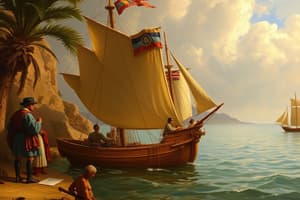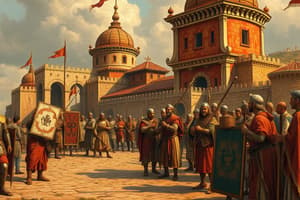Podcast
Questions and Answers
How might the phrase 'God, glory, and gold' summarize the Europeans' motives for exploration?
How might the phrase 'God, glory, and gold' summarize the Europeans' motives for exploration?
Europeans were motivated to spread Christianity and find new trade items to earn them money, or gold.
How did the Treaty of Tordesillas ease tensions between Spain and Portugal?
How did the Treaty of Tordesillas ease tensions between Spain and Portugal?
The Treaty of Tordesillas was an agreement between Spain and Portugal determining the majority of the Americas to be Spain's and most of the East to be Portugal's.
How were the Dutch able to dominate the Indian Ocean trade?
How were the Dutch able to dominate the Indian Ocean trade?
The Dutch had an East India Company which was very rich and powerful.
How did the arrival of Europeans affect the peoples of the East in general?
How did the arrival of Europeans affect the peoples of the East in general?
What role did the Renaissance play in launching an age of exploration?
What role did the Renaissance play in launching an age of exploration?
What was Prince Henry's goal and who actually achieved it?
What was Prince Henry's goal and who actually achieved it?
What European countries were competing for Asian trade during the age of exploration?
What European countries were competing for Asian trade during the age of exploration?
What do you think the people of other countries thought about China after one of Zheng He's visits?
What do you think the people of other countries thought about China after one of Zheng He's visits?
Why do you think the kowtow ritual was so important to the Chinese emperor?
Why do you think the kowtow ritual was so important to the Chinese emperor?
What was the effect of the emphasis on tradition in early modern China?
What was the effect of the emphasis on tradition in early modern China?
How did Beijing become the capital of China?
How did Beijing become the capital of China?
What evidence indicated that China lost interest in contacts abroad after 1433?
What evidence indicated that China lost interest in contacts abroad after 1433?
What did Christian missionaries bring to China?
What did Christian missionaries bring to China?
How would the 'alternate attendance policy' restrict the daimyo?
How would the 'alternate attendance policy' restrict the daimyo?
Why did Europeans want to open trade with Japan?
Why did Europeans want to open trade with Japan?
What happened during the period of the 'Warring State'?
What happened during the period of the 'Warring State'?
What was the structure of society in Tokugawa Japan?
What was the structure of society in Tokugawa Japan?
What were the new styles of drama, art, and literature in Tokugawa Japan?
What were the new styles of drama, art, and literature in Tokugawa Japan?
What were the two main reasons for European exploration?
What were the two main reasons for European exploration?
How did Spain and Portugal solve their differences over claims to new lands?
How did Spain and Portugal solve their differences over claims to new lands?
How did the Dutch and English become Indian Ocean trading powers?
How did the Dutch and English become Indian Ocean trading powers?
How was China influenced by foreigners during the Ming Dynasty?
How was China influenced by foreigners during the Ming Dynasty?
Why was trade a problem during the Qing Dynasty?
Why was trade a problem during the Qing Dynasty?
Which parts of society improved during this time, and which continued to be the same?
Which parts of society improved during this time, and which continued to be the same?
Which three leaders helped bring Japan under one rule?
Which three leaders helped bring Japan under one rule?
What kinds of old and new culture were found in cities?
What kinds of old and new culture were found in cities?
Why did the Japanese seal almost all of their borders?
Why did the Japanese seal almost all of their borders?
Study Notes
European Motives for Exploration
- "God, glory, and gold" encapsulates motivations: spreading Christianity, seeking new trade items, and financial gain.
Treaty of Tordesillas
- An agreement that divided the New World between Spain and Portugal, reducing territorial disputes.
Dutch Dominance in Indian Ocean Trade
- The Dutch East India Company played a crucial role in establishing dominance by driving out English competitors.
Impact of European Arrival on the East
- Overall minimal changes for Eastern societies; introduction of European port cities was a significant outcome.
Renaissance Influence
- The Renaissance ignited a spirit of exploration and discovery, motivating Europeans to explore uncharted territories.
Prince Henry's Goals
- Aimed to reach Eastern treasures and spread Christianity; Portugal established various trading posts in Africa during his time.
Competition for Asian Trade
- Portugal and Spain were the primary European powers vying for trading supremacy in Asia.
Zheng He's Impact on Foreign Perception of China
- Zheng He's voyages showcased Chinese wealth and naval strength through distributed gifts, influencing foreign views on China.
Kowtow Ritual Significance
- The kowtow served as an act of reverence to the emperor, reinforcing loyalty and authority among subjects.
Tradition in Early Modern China
- Strong emphasis on tradition led to the preservation of cultural customs over an extended period.
Beijing as Capital
- Yonglo, son of Hongwu, transferred the royal court to Beijing, establishing it as the capital.
Shift in Chinese Foreign Relations Post-1433
- After 1433, the focus shifted inward as scholar-officials criticized voyages for wasting resources meant for defense.
Christian Missionaries in China
- Introduced Christianity alongside European scientific knowledge and technological advancements.
Alternate Attendance Policy for Daimyo
- Required daimyo to spend alternating years in the capital, leaving their families as hostages, restricting their power.
European Interest in Japanese Trade
- Europeans were drawn to Japan's wealth and sought to establish trade relations.
Warring States Period in Japan
- Characterized by powerful samurai gaining control and offering protection for loyalty during a time of chaos.
Tokugawa Japan Social Structure
- Hierarchical society: Emperor, shogun, daimyo, samurai, peasants/artisans, merchants.
Cultural Developments in Tokugawa Japan
- Flourishing art forms included noh dramas, kabuki theater, haikus, and woodblock prints, alongside traditional themes.
Main Reasons for European Exploration
- Pursuit of new trade routes to Asia, particularly for spices and luxury goods, paired with the intention to spread Christianity.
Resolution of Spanish and Portuguese Claims
- The Treaty of Tordesillas effectively divided global territories, assigning India, Africa, and Asia to Portugal and the Americas to Spain.
Dutch and English in Indian Ocean
- Established East India Companies, empowering them to control trade, negotiate treaties, and maintain military forces.
Foreign Influence in Ming Dynasty China
- While Confucianism prioritized agriculture, foreign missionaries introduced Christianity and new technologies.
Trade Challenges during the Qing Dynasty
- Strict trading rules set by the Chinese government led to difficulties as many foreign traders were unwilling to comply.
Social Improvements and Continuities
- Cultural plays promoted unity; however, gender biases persisted, with sons prioritized over daughters and women retaining limited rights.
Unification of Japan under Leaders
- Oda Nobunaga, Toyotomi Hideyoshi, and Tokugawa Ieyasu were critical figures in bringing Japan under centralized control.
Cultural Landscape in Cities
- Traditional and new cultural elements coexisted, with classic themes and modern performances enriching urban life.
Japan's Closed Borders Policy
- Fear of Christian influence and conversion led to a near-total closure of Japan's borders to foreign influences and missionaries.
Studying That Suits You
Use AI to generate personalized quizzes and flashcards to suit your learning preferences.
Description
This quiz covers the main ideas and section assessments from Chapter 19 of A World History. Explore key concepts such as the motivations behind European exploration and significant treaties, like the Treaty of Tordesillas, that shaped historical dynamics between nations.




